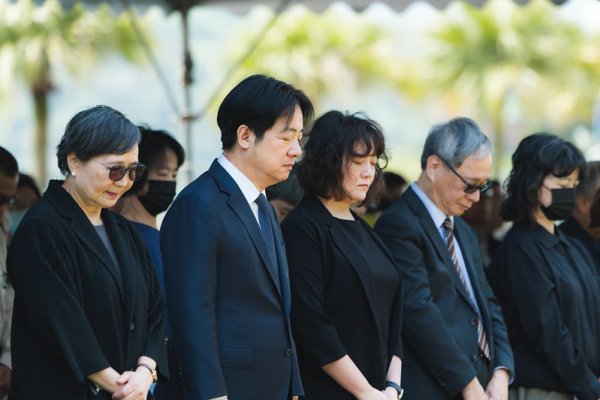Today, April 7th, is “Freedom of Speech Day”, as stated by President of the Republic of China (Taiwan) Tsai Ing-wen, whose mission as president is to continue the country’s survival and development, safeguard hard-earned democratic freedoms, and ensure national sovereignty is not infringed or annexed.
President Tsai attended the “Commemoration of the 36th Anniversary of the Sacrifice of Cheng Nan-jung”. In his speech, he mentioned that 36 years ago was the sacrifice of Cheng Nan-jung (Nylon). 13 years ago, while serving as the mayor of Tainan, he declared April 7th as “Tainan Freedom of Speech Day”, and 9 years ago, after President Tsai Ing-wen took office, it was officially designated as the national “Freedom of Speech Day”. Over the years in various roles such as mayor, premier, and vice-president, he has joined the community in remembering Nylon, always filled with admiration, gratitude, and sorrow.
President Tsai expressed that this year, for the first time as president, he participates in the event to represent the government and the people in expressing the deepest gratitude and respect to Nylon and all the predecessors who have fought for democracy in Taiwan. He promised to unite all sectors of Taiwanese society, harness the power of democracy, and propel Taiwan forward. Nylon advocated against dictatorship, pursued democracy, called for rectification of the February 28th Incident, sought transitional justice, and believed that Taiwan should be its own master, enabling both the land and its people to become free and prosperous.
Through the joint efforts of the Taiwanese people, President Tsai proudly noted that Taiwan has become a beacon of democracy in Asia, ranking second in the “Freedom in the World” report and recognized as the number one democracy in Asia by The Economist Intelligence Unit’s Democracy Index, classifying it as a “full democracy,” all achieved through collective endeavors.
He acknowledged that Taiwan’s commitment to democratic values has become a global model, yet the nation’s democratic freedoms are facing challenges from authoritarian forces. The media, psychological warfare, legal battles initiated by the Chinese Communist Party (CCP), along with increasing gray zone activities, continuously erode Taiwan’s democracy, impacting regional peace and stability. Last year, the number of individuals prosecuted in espionage cases reached 64, four times higher than in 2021. These individuals were found to be funded by the Communist Party, collaborating in actions to undermine Taiwan’s democratic freedoms and constitutional system.
President Tsai cited examples of retired soldiers collaborating with the CCP to establish organizations like the “Taiwan Military Government” to plot government subversion, gathering military personnel lists, inspecting military key areas, disseminating CCP directives to influence public opinion and interfere in Taiwan’s democracy. Even government and opposition party workers are targeted for recruitment by the CCP. Moreover, the CCP’s infiltration extends to cyber threats against Taiwan, specifically targeting government departments and crucial infrastructure.
President Tsai highlighted that last year, the Government Service Network (GSN) faced an average of 2.4 million daily intrusions, doubling from the previous year. In the first quarter of the current year, 134 government agencies and private institutions in Taiwan experienced cyberattacks. Furthermore, in recent weeks, the CCP has conducted multiple military exercises involving significant naval and aerial forces, threatening Taiwanese citizens to abandon their love for the country, freedom, and democracy, challenging international order and unsettling the current state, triggering global condemnation.
“Facing threats from the CCP, the government will respond actively,” President Tsai affirmed. “When individuals cooperate with the CCP to advocate for aggression, subversion of the government, or disrupt Taiwan’s democracy using extreme means, intending to create chaos and harm national security through Taiwan’s freedoms and diversity, the government will take decisive action.”
Stressing that freedom is fragile and requires generations of sacrifice to establish, President Tsai highlighted that it only takes one generation’s mistakes to destroy it. To ensure that future generations can continue to enjoy the fruits of freedom, collective proactive actions are needed to fortify defenses, identifying and addressing potential threats promptly to safeguard national sovereignty and Taiwan’s democratic freedoms.
President Tsai underscored that the designation of “Freedom of Speech Day” by the government aims to promote deeper democratization in Taiwan. He expressed the hope for all Taiwanese, regardless of party affiliation or political stance, to carry on the spirit of Nylon and all democratic predecessors. “As we strive daily in our positions, we work towards our nation, for each other’s democracy, freedom, and prosperity,” he added. “I believe that Nylon’s sacrifice, as hoped by Ms. Cheng Chu-mei, will perpetuate Nylon’s spirit forever in our hearts. Thank you all.”
Subsequently, President Tsai personally paid respects to the portrait of Cheng Nan-jung at the event. In attendance were Minister of Culture Li Yuan, Vice Minister Li Ching-hui, Wang Shih-si, Director of the National Museum of History Chen Yi-shen, Director of the National Human Rights Museum Hong Shih-fang, Legislator Fan Yun, and Chairperson Cheng Chu-mei of the Cheng Nan-jung Foundation.

